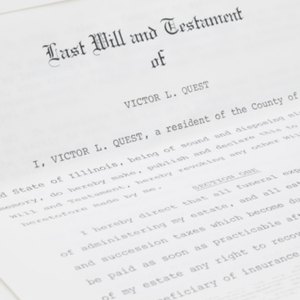
The Uniform Rules for New York State Trial Courts, Part 207, which deals with the surrogate's court rules pertaining to filing petitions for probate and administration, make no references to a timeline for filing this initial request for the court's approval of the will and personal representative after the testator's death. However, each surrogate's court does set specific time limits for the submission of required documents to move a case to closing in a reasonable period of time.
General Timeline for Probate
A general timetable for a typical probated estate in New York could be from three months to one year. In cases where the decedent owned real estate or businesses located in another state or country, the process of petitioning out of state and foreign courts, inventorying and appraising the estate assets could extend the probate process. Unresolved creditor claims and litigation among heirs could delay final distribution and estate closing for years.
Probate Sequence
In general, the executor performs his probate duties in the following order after the estate owner's death: He or his attorney files a legal request, called a petition, to the court asking for validation of the will and approval of the executor. Notification is the sent to heirs and creditors by certified mail and to all other interested parties by public announcement in a local newspaper. Estate property must be identified and inventoried, and all outstanding debts listed. Property is then valued and retitled to the estate where necessary; cash assets are collected in an estate bank account.
Probate Sequence — Continued
An accountant prepares the federal estate and income tax returns and makes an estimate of the total taxes due, debts payable and outstanding probate expenses to close probate. The executor may have to sell estate assets to meet all expenses. Creditors and taxes are then paid, and beneficiaries receive a preliminary accounting of the net distributable estate. The executor petitions the court for approval of the final accounting. Assets are distributed to beneficiaries, who sign beneficiary agreements. The executor then asks the court to close probate and discharge him from his duties.
New York State Small-Estate Affidavit Program
An estate valued at $30,000 or less and consisting of mostly cash or securities can be immediately claimed by a surviving spouse without filing any papers and with minimal legal expense simply by presenting a death certificate and an affidavit stating she hasn't received more than $30,000 in total from all sources. This program may not be used when an executor or administrator has been appointed by the court or when other personal property or real estate are part of the estate. A voluntary administrator may be appointed in a simplified proceeding to dispose of the remaining personal property in a small estate even when it includes real estate.
References
- 1800Probatecom: New York Probate — Probate in New York
- Law Offices of Albert Gurevich: A Sample Probate Timeline
- Rudolf J. Karvay, Estate & Trust Law: Settle a Small Estate Without Going to Court
- Federal Trade Commission Consumer Information. “Debts and Deceased Relatives.” Accessed March 4, 2020.
- The Judiciary State of Hawai‘i. “Hawai'i Probate Rules.” Accessed March 4, 2020.
- Virginia Law. “Code of Virginia, § 64.2-452. How Will May Be Made Self-Proved; Affidavits of Witnesses.” Accessed March 4, 2020.
- Utah Courts. “Civil Terminology for Utah Interpreters,” Pages 20-21. Accessed March 4, 2020.
- Iowa Trust Code. “Chapter 633A,” Page 20. Accessed March 4, 2020.
- Utah Code. “Employment of Appraisers,” Page 24. Accessed March 4, 2020.
- The Superior Court of California, County of Santa Clara. “Closing and Distributing the Probate State." Accessed March 4, 2020
- Michigan Legislature. “700.3801 Notice of Creditors.” Accessed March 4, 2020
- Alaska Court System. “How Long Does a Creditor Have to Make a Claim Against the Estate?” Accessed March 4, 2020.
- Internal Revenue Service. “Filing Estate and Gift Tax Returns.” Accessed March 4, 2020.
- The Superior Court of California, County of Santa Clara. “Closing and Distributing the Probate State." Accessed March 4, 2020.
- New York State Unified Court System. “When There Is No Will.” Accessed March 4, 2020.
Writer Bio
Sandro Puccinelli began writing motivational and inspirational pieces in 1989 as part of his managerial responsibilities for a major insurance company. His essays have appeared in various insurance industry journals, including “Forum,” “Managers Magazine” and “Insurance Selling.” Puccinelli holds a Bachelor of Arts in political science from Williams College, as well as several advanced certifications in banking and insurance.

